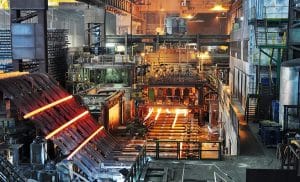 For decades, heat exchangers have become an increasingly more popular solution for companies to keep their electrical control panels and other enclosures properly cooled. As they strive to streamline operations, lower their reliance on energy, and reduce their overall costs, the innovative thermal management solutions have proven a valuable resource. However, for some companies, improved thermal management means more than just reducing costs. For example, in companies that operate in hazardous conditions, electrical cooling solutions also have to provide an optimal measure of safety and an ability to operate with a minimal need for interaction. (more…)
For decades, heat exchangers have become an increasingly more popular solution for companies to keep their electrical control panels and other enclosures properly cooled. As they strive to streamline operations, lower their reliance on energy, and reduce their overall costs, the innovative thermal management solutions have proven a valuable resource. However, for some companies, improved thermal management means more than just reducing costs. For example, in companies that operate in hazardous conditions, electrical cooling solutions also have to provide an optimal measure of safety and an ability to operate with a minimal need for interaction. (more…)
Designing Thermal Management with Efficiency in Mind
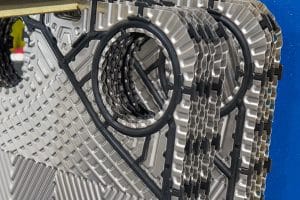 With any technological innovation or new iteration on existing technologies, one of the greatest selling points is an improvement in efficiency. The same is true for electrical thermal management solutions, though in that case, efficiency is often more challenging to accomplish. Applications that include more powerful, longer-running components housed in smaller, sleeker designs need cooling solutions that provide more efficient and reliable thermal management in increasingly limited spaces. Thanks to their advanced, highly customizable methods of transferring electrical waste heat, modern heat exchangers are often the ideal thermal management solution. (more…)
With any technological innovation or new iteration on existing technologies, one of the greatest selling points is an improvement in efficiency. The same is true for electrical thermal management solutions, though in that case, efficiency is often more challenging to accomplish. Applications that include more powerful, longer-running components housed in smaller, sleeker designs need cooling solutions that provide more efficient and reliable thermal management in increasingly limited spaces. Thanks to their advanced, highly customizable methods of transferring electrical waste heat, modern heat exchangers are often the ideal thermal management solution. (more…)
Improved Thermal Management for Food & Beverage Production
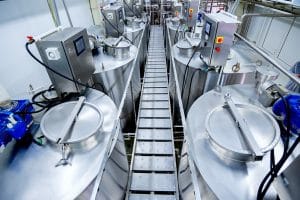 Food and beverage companies have faced many challenges over the years, especially as technology has transformed it and every other industry. One of those challenges has been how to most effectively and efficiently the increasingly more demanding thermal management needs of food and beverage production. In addition to cooling electrical enclosures, as companies in every other industry must account for, food and beverage companies also face several unique thermal management needs. In many cases, heat exchangers have provided these companies with the optimal solution for addressing them, as well as the more common electrical thermal management needs they share with other industries. (more…)
Food and beverage companies have faced many challenges over the years, especially as technology has transformed it and every other industry. One of those challenges has been how to most effectively and efficiently the increasingly more demanding thermal management needs of food and beverage production. In addition to cooling electrical enclosures, as companies in every other industry must account for, food and beverage companies also face several unique thermal management needs. In many cases, heat exchangers have provided these companies with the optimal solution for addressing them, as well as the more common electrical thermal management needs they share with other industries. (more…)
A Few Benefits to Modern Phase-Change Cooling
 Over the last several decades, as technology has advanced and taken over significant portions of modern manufacturing and other industries, a variety of electrical thermal management methods have evolved to keep up. For many companies, phase-change cooling has been one of the most important of those methods. Utilized by advanced heat exchangers and similar custom thermal solutions, phase-change cooling is the process of using an eco-friendly cooling fluid and its latent heat of vaporization to rapidly transfer electrical waste heat. It can be effective even for the most demanding applications, and can create continuous heat transfer with minimal energy. (more…)
Over the last several decades, as technology has advanced and taken over significant portions of modern manufacturing and other industries, a variety of electrical thermal management methods have evolved to keep up. For many companies, phase-change cooling has been one of the most important of those methods. Utilized by advanced heat exchangers and similar custom thermal solutions, phase-change cooling is the process of using an eco-friendly cooling fluid and its latent heat of vaporization to rapidly transfer electrical waste heat. It can be effective even for the most demanding applications, and can create continuous heat transfer with minimal energy. (more…)
The Value in Modern Air-to-Air Heat Exchangers
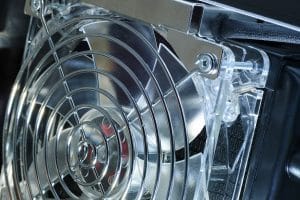 The more powerful modern technology becomes, the more powerful and efficient its electrical thermal management must be. At first, that can seem like a need for more complex, complicated ways to generate chilled air faster than electrical components can generate waste heat. However, when it comes to efficient thermal management, more complex doesn’t always mean more powerful. For many modern applications, some of the simplest forms of heat transfer – such as air-to-air cooling – remain the most reliable and high-performance solutions. (more…)
The more powerful modern technology becomes, the more powerful and efficient its electrical thermal management must be. At first, that can seem like a need for more complex, complicated ways to generate chilled air faster than electrical components can generate waste heat. However, when it comes to efficient thermal management, more complex doesn’t always mean more powerful. For many modern applications, some of the simplest forms of heat transfer – such as air-to-air cooling – remain the most reliable and high-performance solutions. (more…)
Optimal Electrical Cooling with Little or No Maintenance
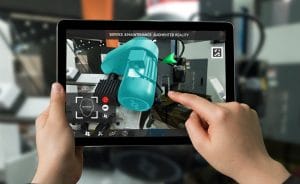 Of the many different concerns that come with electrical thermal management, maintenance might not always seem like one of the most important. However, when compared to the frequent routine maintenance and unforeseen repairs that are often needed with traditional cooling solutions, the reduced need to maintain heat exchangers is an extremely important benefit. It all stems from the simpler, more manageable designs of modern heat exchangers, which don’t include the same complex machinery and numerous external moving parts that make routine maintenance necessary on older solutions. (more…)
Of the many different concerns that come with electrical thermal management, maintenance might not always seem like one of the most important. However, when compared to the frequent routine maintenance and unforeseen repairs that are often needed with traditional cooling solutions, the reduced need to maintain heat exchangers is an extremely important benefit. It all stems from the simpler, more manageable designs of modern heat exchangers, which don’t include the same complex machinery and numerous external moving parts that make routine maintenance necessary on older solutions. (more…)
Next-Level Thermal Management for Advanced Computers
 The advanced state of computing technology today is a culmination of many different advancements in several different technological areas. One of the most impactful of those advancements has been the advent of streamlined electrical thermal management. Traditional electrical cooling was a cumbersome process, and one that didn’t lend itself well to innovation. It’s difficult to make an application smaller and more powerful when it’s thermal management needs must be handled by large, hard-to-manage air conditioning units. However, with heat exchangers and other custom thermal solutions, and the next-level thermal management that they provide, computers and all other forms of technology have been able to advanced more rapidly than ever. (more…)
The advanced state of computing technology today is a culmination of many different advancements in several different technological areas. One of the most impactful of those advancements has been the advent of streamlined electrical thermal management. Traditional electrical cooling was a cumbersome process, and one that didn’t lend itself well to innovation. It’s difficult to make an application smaller and more powerful when it’s thermal management needs must be handled by large, hard-to-manage air conditioning units. However, with heat exchangers and other custom thermal solutions, and the next-level thermal management that they provide, computers and all other forms of technology have been able to advanced more rapidly than ever. (more…)
Wastewater Treatment – An Advantage of Heat Exchangers
 The more companies utilize heat exchangers for their thermal management needs, the more the benefits pile up. Heat exchangers are versatile, eco-friendly solutions designed to streamline the process of electrical cooling, making it easier and more efficient for companies to keep their electrical equipment properly cooled. They don’t utilize traditional HVAC processes, so they don’t require the same levels of energy and maintenance that air conditioners do. However, in addition to the savings in energy and overhead costs, heat exchangers also provide several other unique, highly important advantages, such as making wastewater treatment more efficient. (more…)
The more companies utilize heat exchangers for their thermal management needs, the more the benefits pile up. Heat exchangers are versatile, eco-friendly solutions designed to streamline the process of electrical cooling, making it easier and more efficient for companies to keep their electrical equipment properly cooled. They don’t utilize traditional HVAC processes, so they don’t require the same levels of energy and maintenance that air conditioners do. However, in addition to the savings in energy and overhead costs, heat exchangers also provide several other unique, highly important advantages, such as making wastewater treatment more efficient. (more…)
Better Cooling for Better Technology, and Why It Matters
 Technology builds on itself, and the most advanced solutions are those that improve on every aspect of their previous versions. Because all technology requires an efficient way to prevent electrical overheating, the advancement of modern electrical thermal management has been one of tech’s most important building blocks. In many cases, that advancement has come in the form of modern heat exchangers, which are customizable thermal solutions that utilize natural, eco-friendly methods of transferring heat. With better, more efficient cooling technology, other advancements haven’t been held back by power and electrical cooling constraints. (more…)
Technology builds on itself, and the most advanced solutions are those that improve on every aspect of their previous versions. Because all technology requires an efficient way to prevent electrical overheating, the advancement of modern electrical thermal management has been one of tech’s most important building blocks. In many cases, that advancement has come in the form of modern heat exchangers, which are customizable thermal solutions that utilize natural, eco-friendly methods of transferring heat. With better, more efficient cooling technology, other advancements haven’t been held back by power and electrical cooling constraints. (more…)
Customizing Thermal Solutions for Greener Energy
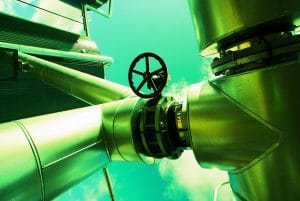 Over the last several decades, the goals of major industries haven’t changed much. Companies have always sought to be the most competitive in their industries, and to provide the highest quality products and services to their customers and clients. However, these days, implementing greener, cleaner, and more efficient technological solutions is just as important as streamlining operations and boosting productivity. Fortunately, in the realm of thermal management, heat exchangers and similar custom thermal solutions have helped companies meet all of these goals and implement greener solutions at minimal costs. (more…)
Over the last several decades, the goals of major industries haven’t changed much. Companies have always sought to be the most competitive in their industries, and to provide the highest quality products and services to their customers and clients. However, these days, implementing greener, cleaner, and more efficient technological solutions is just as important as streamlining operations and boosting productivity. Fortunately, in the realm of thermal management, heat exchangers and similar custom thermal solutions have helped companies meet all of these goals and implement greener solutions at minimal costs. (more…)







